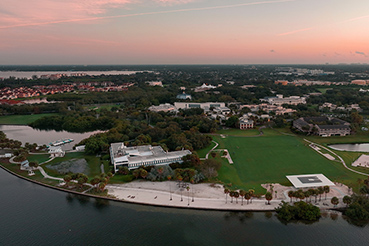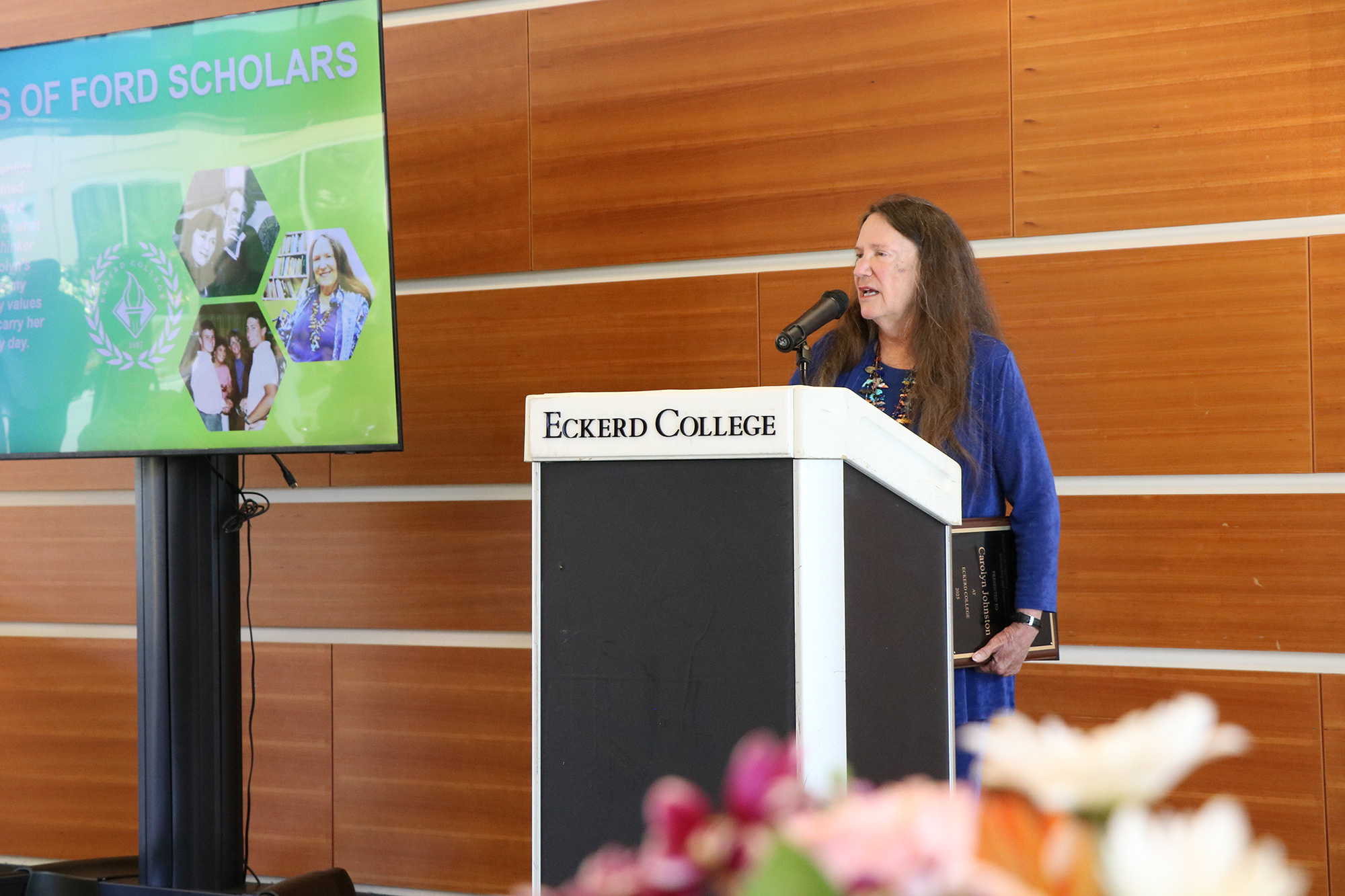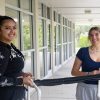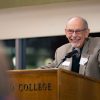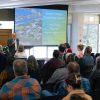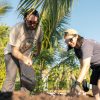A self-described “farm boy from the Appalachians,” James D. Moore ’68, M.D., recently made a lasting and decidedly impactful mark on Eckerd College.
Made possible by a $4 million commitment from Moore and his wife, Judy: After 38 years, the Ford Apprentice Scholars Program at Eckerd has shifted gears—and funding—and will become the Johnston-Ford Scholars Program. In addition, the College unveiled an annual award—the Moore Family Award for Excellence in Supporting Undergraduate Research, Scholarship and Creative Activity—to honor the academic contributions made by a faculty member each year.
Eckerd College President James J. Annarelli, Ph.D., announced the gift on May 16 during the annual Celebration of Scholarship, an event that brings together members of the Eckerd community to celebrate the scholarly accomplishments of the faculty through publication, creative expression, professional service, and recognition.
“Most endowments are focused on scholarships, which is wonderful,” Moore says, “or gifts for buildings, dormitories, libraries … Those are great, and schools need them. But recognizing remarkable faculty is also very important. They’re the key to unlocking the potential in every student. They’re the secret ingredient that makes the magic happen.
“This is a way of rewarding deserving faculty.”
The renamed Johnston-Ford Scholars Program honors Carolyn Johnston, Ph.D., professor of history and American studies at Eckerd and the Elie Wiesel Professor of Humane Letters. The program has been funded by the College in recent years; in the future, it will be funded by a dedicated endowment.
The faculty award established by the Moores will be awarded annually to the faculty member whose support for undergraduate research, scholarship and creative activity has had a significant impact on their students, their discipline and the College.
The inaugural Moore Family Award recipient, as chosen by a faculty selection committee, is Carolyn Johnston.
“I am profoundly grateful and overwhelmed,” Johnston said at the Celebration of Scholarship as she stood next to Annarelli. She didn’t know about the renaming of the Ford program or the establishment of the Moore Family Award until Annarelli’s announcement moments before. “I want to thank the Moore family for this overwhelmingly generous gift,” she added. “I’m really speechless. And I’m rarely speechless.”
Johnston had joined the Eckerd faculty in 1978 after earning her bachelor’s degree in history from Samford University and her master’s and doctorate degrees in history from the University of California at Berkeley. She has written six books, was a Pulitzer Prize nominee, and is a recipient of a Woodrow Wilson Fellowship and a Danforth Fellowship. At Eckerd, she taught 24 courses with Dr. Wiesel—the world-renowned author, human rights activist and Holocaust survivor—and helped develop Eckerd programs, such as the environmental studies major and the women’s and gender studies major. Johnston, along with the late Professor Emerita of American Studies Catherine Griggs, Ph.D., brought the Discover Native America with the Seminole Tribe of Florida Festival to Eckerd in 1999 and 2000.
Johnston also has been a driving force behind the Ford Apprentice Scholars Program from its inception in 1987, when it was launched by a grant from the Ford Foundation. The program was sustained by a second Ford grant in 1991 and has since been supported by the College.
Each year, the program offers up to 20 rising juniors the opportunity to participate in a two-year course of study designed to prepare them for graduate school and to pursue a career in college or university teaching.
The Moore family also directed a portion of their gift to create the College’s first Endowed Professorship in Marine Science.
Moore’s involvement with Eckerd College began when Florida Presbyterian (now Eckerd) College was just six years old. That’s when Moore, at the time a high school student from Abingdon, Virginia, decided to mail in his application. He sought an experience outside the ordinary. “Every college I visited, the curriculum was the same ol’, same ol’ cookie-cutter required classes,” he explained recently during a phone conversation from his home in Virginia.
After a little advice, he decided to apply to a new and different option. “A family friend had a son who had gone to a school in Florida and loved it. And he said I should check it out. So I applied in 1964 to Florida Presbyterian. The guidance counselors at my high school were freaking out, because they couldn’t find Florida Presbyterian College in any of the catalogs.
“I majored in biology, and it was remarkable,” Moore adds. “The professors were great, and the classes were small, so you got a lot of individual attention. It was an out-of-body experience for a farm boy from the Appalachians.”
His decision to honor faculty with an annual award reflects his own undergraduate experience. Moore did much of his research alongside William B. Roess, Ph.D., a professor of biology who in 1994 became the inaugural winner of Eckerd’s Teaching Excellence and Campus Leadership Award. “Bill brought me into his research,” Moore explains. The undergraduate research and support from faculty made his Eckerd education unlike any other decades before “undergraduate research” became a higher-ed catchphrase. “After spending my last two years working with Bill, I realized I wanted to go to medical school. But it was the whole experience at Eckerd and the support all the faculty provided.
“I don’t think I would have gotten that anywhere else. There were just a handful of science majors at the College back then. We were a pretty tight-knit group. I loved every minute of it.”
After receiving his medical degree from the Medical College of Virginia, Moore specialized in obstetrics and gynecology in Abingdon for more than 50 years. He joined the Eckerd College Board of Trustees in 2007 and is currently an honorary trustee. He has been supporting the College’s fundraising priorities since the eighties. He and his wife, Judy, live in Abingdon on a historic farm where the Moore family has lived since the Civil War.
Moore got to know Carolyn Johnston while he was attending Board of Trustees meetings at Eckerd. He also became familiar with her through his son, Jimmy Moore, who graduated from the College in 2000 and had Johnston as a mentor.
Among the guests at the Celebration of Scholarship was one of Johnston’s former students and the 2025 Eckerd Commencement speaker, Melissa Seixas ’92.
As Duke Energy Corporation’s state president in Florida, she once said, “I guarantee you, I am the absolute first American history major to lead this company.”
To see Johnston honored, Seixas says, “is the recognition of the talent and the gift that she has given to her students and the field of history. I’m more excited for her than I would be for myself. And I think a lot of people feel that way about her.”
The two have kept in touch over the years. “I think of her every day,” Seixas says. “She has a real presence in my life. She’s incredibly brilliant and a very kind person as well. I really try to hold that reminder that she’s just a good person.”
The Moore Family Endowment for Faculty Excellence, says Christine Wooley, Ph.D., vice president for academic affairs and dean of faculty at Eckerd, will not only recognize faculty for their support of undergraduate research, it will show our faculty how much “we value the excellence they bring to campus.
“Thanks to the Moore family, we have the opportunity to recognize the extraordinary impact Carolyn has had on the College, her colleagues and, most importantly, the students who benefited from her unflagging support. She has led 38 different cohorts of Ford Scholars who benefited from her wisdom, energy and commitment.
“And by renaming the Ford program to honor Carolyn,” she adds, “we shine a light on the best of what Eckerd faculty do.”

